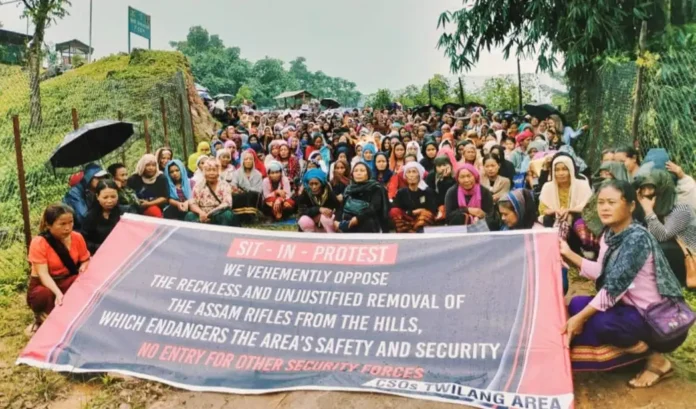In a powerful demonstration of solidarity and concern for security, Kuki-Zo women in Manipur’s Kangpokpi district have staged protests against the withdrawal of Assam Rifles from the region. The protesters, primarily women, voiced fears that the removal of Assam Rifles could exacerbate the already fragile security situation in the area, potentially leading to unrest and violence. This move has sparked debates about the security dynamics in Manipur, particularly in sensitive regions like Kangpokpi, which have witnessed ethnic tensions in the past.
The Role of Assam Rifles in Kangpokpi
The Assam Rifles, one of India’s oldest paramilitary forces, has played a crucial role in maintaining peace and security in the North Eastern states, including Manipur. Known as the “Sentinels of the Northeast,” the Assam Rifles have been actively deployed in volatile regions to counter insurgency, protect civilians, and maintain law and order.
In Kangpokpi, a district that has been sensitive to ethnic clashes and security concerns, the Assam Rifles have been instrumental in providing a sense of safety to the local population. Their presence has often deterred criminal activities, insurgency, and inter-ethnic violence, ensuring peace and stability.
The withdrawal of Assam Rifles from Kangpokpi has raised concerns, particularly among the Kuki-Zo community, a minority ethnic group in the region. The reasons for the protests are tied to the community’s deep concerns about the potential security vacuum that could arise after the withdrawal.
Key concerns voiced by the protesters include:
- Fear of Increased Violence: The Kuki-Zo women fear that the absence of Assam Rifles could lead to a resurgence of violence, including ethnic clashes, insurgent activities, and criminal acts. The region’s history of instability has made security a primary concern for the community.
- Lack of Trust in Local Security Forces: The protesters expressed doubts about the ability of local security forces to handle the security situation effectively. The Assam Rifles, with their extensive experience in counter-insurgency operations, are seen as a stabilizing force, and their withdrawal raises concerns about the ability of other security forces to fill the gap.
- Protection of Vulnerable Communities: The Kuki-Zo community, being a minority, feels particularly vulnerable without the protection of the Assam Rifles. Women protesters highlighted their fear of being targeted by rival groups, especially in the absence of a strong security presence.
Response from the Authorities
The protests have garnered significant attention from both state and central authorities. The Manipur government and local officials have acknowledged the concerns raised by the Kuki-Zo women but have yet to provide a clear response regarding the redeployment of Assam Rifles or alternative security arrangements.
The central government, which oversees the deployment of paramilitary forces like the Assam Rifles, has been reviewing security policies in the region as part of broader peacekeeping and stabilization efforts. However, no formal statement has been issued about reversing the decision to withdraw the Assam Rifles from Kangpokpi.
Potential Impact on Local Stability
The withdrawal of the Assam Rifles from Kangpokpi could have significant implications for the region’s stability:
- Security Vacuum: The removal of a key paramilitary force like the Assam Rifles could create a security vacuum, potentially inviting insurgent groups or rival factions to exploit the situation. This could lead to a resurgence of violence and unrest in the region.
- Loss of Confidence in Security Forces: The protests indicate a lack of confidence in local security forces. If the withdrawal proceeds without proper replacement forces or assurances of safety, the local population may feel abandoned, leading to heightened tensions.
- Risk of Ethnic Clashes: Kangpokpi has a history of ethnic tensions, and the withdrawal of a neutral, experienced force like the Assam Rifles could reignite old hostilities. The fear among minority groups like the Kuki-Zo is that without strong security measures, they could be at risk of being targeted by other ethnic groups.
The protest by Kuki-Zo women highlights the active role that women play in the community’s social and political spheres. Women in Northeast India, particularly in tribal communities, have historically taken the lead in peace-building efforts and have been vocal advocates for the security and welfare of their communities.
The current protest reflects the women’s deep sense of responsibility toward ensuring the safety of their families and the broader community. Their collective voice serves as a reminder of the critical role that civil society, particularly women’s groups, play in influencing security policies and decisions in conflict-prone regions.


